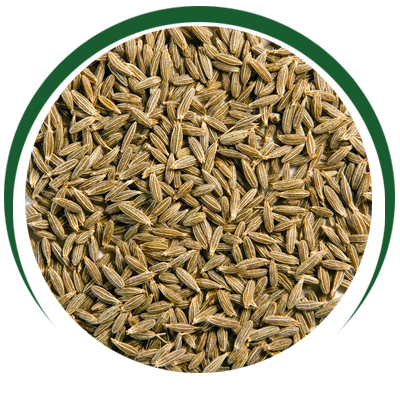Cumin is the dried seed of the herb Cuminum cyminum, a member of the parsley family. The cumin plant grows to 30-50 cm (0.98-1.6 ft) tall and is harvested by hand. It is an herbaceous annual plant, with a slender branched stem 20-30 cm tall. The leaves are 5-10 cm long, pinnate or bipinnate, thread-like leaflets. The flowers are small, white or pink, and borne in umbels. The fruit is a lateral fusiform or ovoid achene 4-5 mm long, containing a single seed. Cumin seeds resemble caraway seeds, being oblong in shape, longitudinally ridged, and yellow-brown in color, like other members of the Umbelliferae family such as caraway, parsley and dill.

Origins and Cultivation:
Scientific Name: Cuminum Cyminum
Family Name: Apiaceae
Commercial part: Fruit
Usage
Cumin is the second most popular spice in the world after black pepper. Cumin seeds are used as a spice for their distinctive aroma, popular in Nepalese, Indian, Pakistani, North African, Middle Eastern, Sri Lankan, Cuban, northern Mexican cuisines, central Asian Uzbek cuisine, and the western Chinese cuisines of Sichuan and Xinjiang. Cumin can be found in some Dutch cheeses, such as Leyden cheese, and in some traditional breads from France. It is commonly used in traditional Brazilian cuisine. Cumin can be an ingredient in chili powder (often Texan or Mexican-style), and is found in achiote blends, adobos, sofrito, garam masala, curry powder, and bahaarat.
Cumin can be used ground or as whole seeds. Cumin was also used heavily in ancient Roman cuisine. It helps to add an earthy and warming feeling to cooking, making it a staple in certain stews and soups, as well as curries and chilli.
Medicine
In South Asia, cumin tea (dry seeds boiled in hot water) is used to distinguish false labour (due to gas) from real labour. In Sri Lanka, toasting cumin seeds and then boiling them in water makes a tea used to soothe acute stomach problems. People in parts of South Asia commonly believe cumin seeds help with digestion. Some scientific evidence suggests cumin may aid digestion by stimulating enzymes to break down foods.
Packaging
» 25 Kg, 40 Kg & 50 Kg New Jute / Gunny Bags with or without inner bag / poly lined.
» 25 Kg & 50 Kg Poly Propylene (PP) Bags
» Or as per customers specification / requirement.
